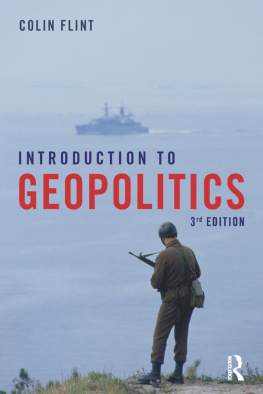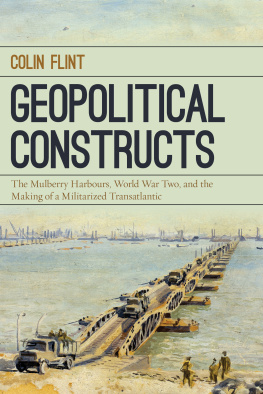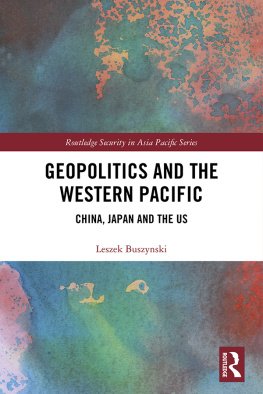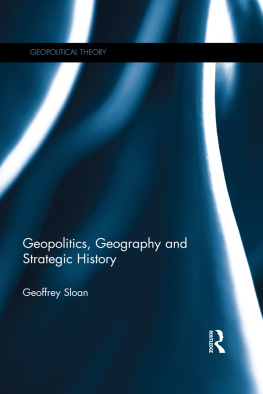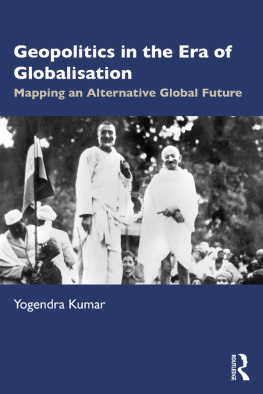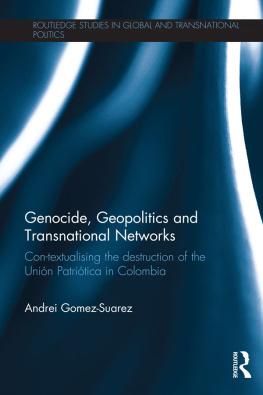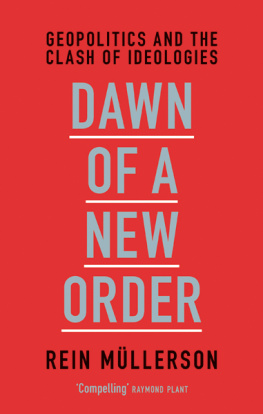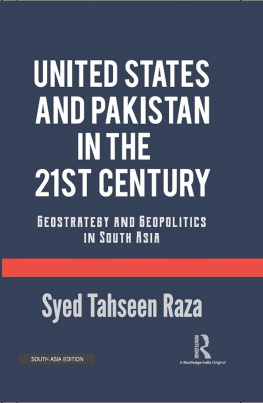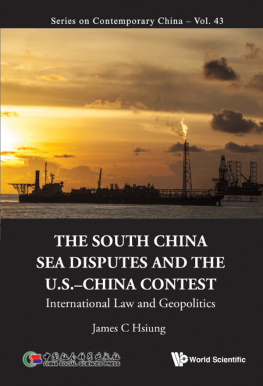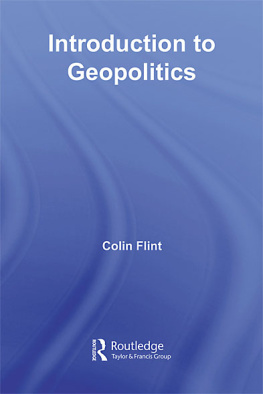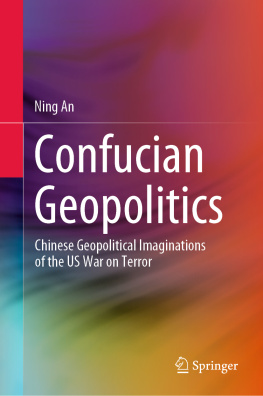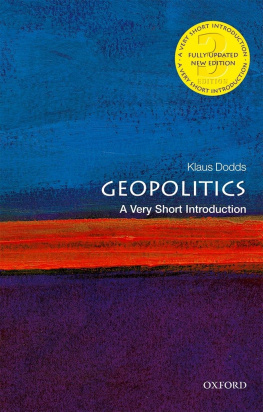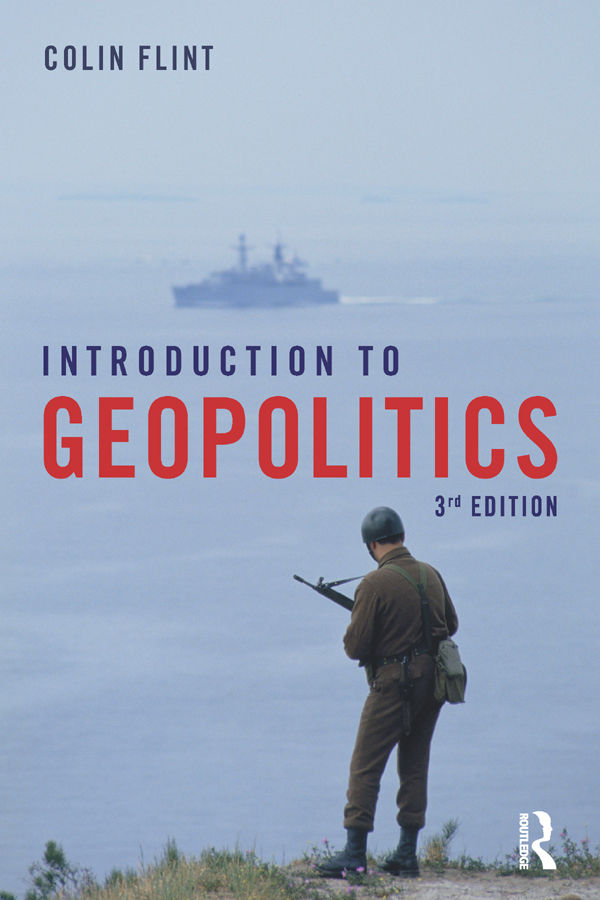Introduction to
Geopolitics
Third Edition
This new updated edition of Introduction to Geopolitics presents the overarching themes of geopolitical structures and agents in an engaging and accessible manner, which requires no previous knowledge of theory or current affairs.
Using new pertinent case studies and guided exercises, the title explains the contemporary global power of the United States and the challenges it is facing, the persistence of nationalist conflicts, migration, cyberwar, terrorism, and environmental geopolitics. Case studies of the rise of the so-called Islamic State, the South China Sea disputes, the Syrian civil war, the Korean conflict, and IsraelPalestine emphasize the multi-faceted nature of conflict. The book raises questions by incorporating international and long-term historical perspectives and introduces readers to different theoretical viewpoints, including feminist contributions. The new edition features expanded sections on network geopolitics and non-state actors, a new section on geopolitics of transnational business, cyberwar, an interpretation of ISIS within historical geopolitical trends, as well as expanded discussion of the relevance of Boserup and neo-Malthusians to environmental geopolitics.
Introduction to Geopolitics will provide its readers with a set of critical analytical tools for understanding the actions of states as well as non-state actors operating in competition over resources and power. Both students and general readers will find this book an essential stepping stone to a deeper and critical understanding of contemporary conflicts.
Colin Flint is a Professor in the Department of Political Science, Utah State University, USA. He is author of Geopolitical Constructs, a co-author, with Peter Taylor, of Political Geography: World-Economy, Nation-State and Locality, and a co-editor of the journal Geopolitics.
Introduction to Geopolitics
Third Edition
Colin Flint
Third edition published 2017
by Routledge
2 Park Square, Milton Park, Abingdon, Oxon, OX14 4RN
and by Routledge
711 Third Avenue, New York, NY 10017
Routledge is an imprint of the Taylor & Francis Group, an informa business
2017 Colin Flint
The right of Colin Flint to be identified as author of this work has been asserted by him in accordance with sections 77 and 78 of the Copyright, Designs and Patents Act 1988.
All rights reserved. No part of this book may be reprinted or reproduced or utilised in any form or by any electronic, mechanical, or other means, now known or hereafter invented, including photocopying and recording, or in any information storage or retrieval system, without permission in writing from the publishers.
Trademark notice: Product or corporate names may be trademarks or registered trademarks, and are used only for identification and explanation without intent to infringe.
First edition published by Routledge 2006
Second edition published by Routledge 2012
British Library Cataloguing in Publication Data
A catalogue record for this book is available from the British Library
Library of Congress Cataloging in Publication Data
Names: Flint, Colin, 1965 author.
Title: Introduction to geopolitics / Colin Flint.
Description: Third edition. | Abingdon, Oxon; New York, NY: Routledge is an imprint of the Taylor & Francis Group, an Informa Business, [2017] | Includes bibliographical references and index.
Identifiers: LCCN 2016019448| ISBN 9781138192157 (hardback: alk. paper) | ISBN 9781138192164 (pbk.: alk. paper) | ISBN 9781315640044 (ebook)
Subjects: LCSH: GeopoliticsTextbooks.
Classification: LCC JC319 .F55 2017 | DDC 320.1/2dc23
LC record available at https://lccn.loc.gov/2016019448
ISBN: 978-1-138-19215-7 (hbk)
ISBN: 978-1-138-19216-4 (pbk)
ISBN: 978-1-315-64004-4 (ebk)
Typeset in Times New Roman
by Graphicraft Limited, Hong Kong
CONTENTS
.
. I am very grateful for her skill, innovation, and vision.
Special thanks to Steve Radil for his suggestions regarding the reorganization of , and to Hannah Penner for her thoughtful reading of the manuscript and the many editorial suggestions. I am also very grateful to Egle Zigaite at Routledge for her careful stewardship of the book through its many stages. Also, a huge thank you to Andrew Mould for coming up with the idea of the first edition. I would also like to thank the reviewers of the second edition who took their time to offer thoughtful and very helpful comments and suggestions for this edition. I am surprised and flattered by the global appeal of this book, and to those who have translated it into different languages, especially Akihiko Takagi, Takashi Yamazaki, and Myongsob Kim. Thanks to Vincent Filicetti for helping me find and collect data that has remained from the previous editions.
Finally, thanks to the students of POLS 2400 at Utah State University who have adopted this book with particular enthusiasm and motivate me to continue to explore and adapt the material.
ACLJ American Center for Law and Justice
AIIB Asian Infrastructure Investment Bank
AQI al-Qaeda in Iraq
ASEAN Association of Southeast Asian Nations
BCA Budget Control Act
BSPP Burmese Socialist Program Party
CENTCOM Central Command (US military)
CIA Central Intelligence Agency
CND Campaign for Nuclear Disarmament
CPB Communist Party of Burma
DARPA Defense Advanced Research Projects Agency
DDOS distributed denial of service
DOS denial of service
DSG Defense Strategic Guidance
EEZ exclusive economic zone
ETA Euskadi Ta Askatasuna
EU European Union
FAO Food and Agriculture Organization
GEOINT Geospatial Intelligence
GIS geographic information system
HUM Hizbul Mujahideen
IGO inter-governmental organization
IIGCC Institutional Investors Group on Climate Change
IMET International Military Education and Training Program
IMF International Monetary Fund
IPCC Intergovernmental Panel on Climate Change
IRA Irish Republican Army
ISI Islamic State of Iraq
ISI Inter-services Intelligence
ISIS/ISIL Islamic State
ISL Islamic Students League
JEI Jamaat-e-Islami
JKJEI Jammu and Kashmir Jamaat-e-Islami
JKLF Jammu and Kashmir Liberation Front
JKPC Jammu and Kashmir Peoples Conference
KDP Korean Democratic Party
KNU Karen National Union
LORCs Law and Order Restoration Councils
MAD mutually assured destruction
MOOTWA military operations other than war
NAFTA North American Free Trade Agreement
NATO North Atlantic Treaty Organization
NGA National Geospatial-Intelligence Agency
NGO non-governmental organization
NLD National League for Democracy
NPT Nuclear Non-proliferation Treaty
NSC National Security Council
NSG National System for Geospatial-Intelligence
NSS National Security Strategy
OPT occupied Palestinian territory
PCCP From Potential Conflict to Co-operation Potential
PLO Palestine Liberation Organization
PMC private military contractor
POTB Prevention of Terrorism Bill
RDJTF Rapid Deployment Joint Task Force
RFID radio frequency identification

